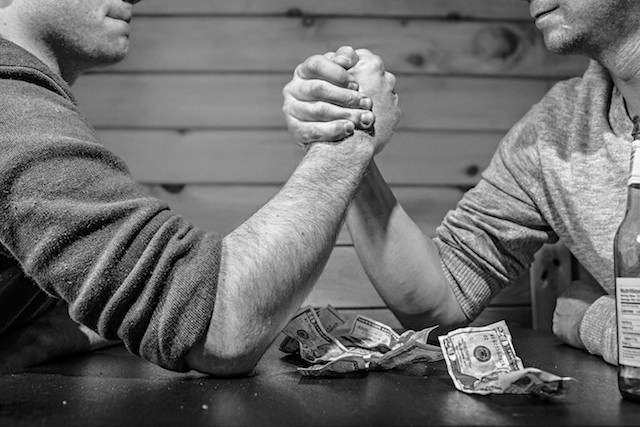Last Saturday, I organised a sports team of 14 through a rigorous two and a half hour tournament. But just before, I had a small, 10-second altercation with a friend.
Clarity first:
On Saturday morning, I got up at 6:30 a.m. I jumped into my ice cold swimming pool and then I jumped under the ice cold pressurized water outlet I have set up outside to wash the chlorine off.
This is how most of my mornings begin, and it’s an excellent way to get clear quickly. Clarity is particularly important because without it, I am less aware of my internal processes, I miss the devil in the detail and therefore I can more easily react negatively in moments of conflict instead of responding consciously. I would normally do a walking meditation in the morning as well but due to the day’s tight schedule, I left it for the evening.
Saturday was a little different than most. The sports team, which I am a captain of, had a big event on. The team is made largely of Buddhist practitioners but also of friends who love the sport and like our philosophy. We play to be present in the moment, to be fiercely here and now, and also to practice being cool and calm under fire. It also brings us closer together, which helps us each through times of trouble. We become like brothers, caring for each other and helping each other toward higher consciousness.
Coming face-to-face with conflict:
We arrived at the event and one of my team members was late. I received a message from my girlfriend who, along with some other friends, had seen this team member. Realizing he was running late, one of the friends said to him, “Shouldn’t you be heading off to the event?” To which he replied, “Yeah, but I’m not in any hurry.” Then he smiled and sauntered off in the other direction.
For the sake of imparting to you some useful understanding and practices for being happy, I will now begin to shamelessly expose my internal process over this small incident.
Managing events is not always easy, and I needed my team to work together and follow my calls for the day. So when I heard what my friend had said, I registered a feeling of betrayal. I felt a contraction inside. Then, realising that I needed to say something to him when he did arrive, I felt fear, and contracted further.
This is the beginning of my encounter with myself. I use the word encounter because I get to see myself, my reactions, and my own patterns playing out—I encounter myself.
I have been the boss of hundreds of employees over the last 12 years and I have captained this sports team for about seven years now. I know my guys well, and I recognised the disrespect from this particular player and his issues with authority. I needed to ensure this sort of negative attitude didn’t spread across to the other guys because working together at this event was important for the cohesion and success of the day, as well as for bonding together as friends and as a community.
I also needed to deal with this attitude of his in order to take care of the guys who have put so much into being there, to help each other, and who would feel disappointment if someone let them down and become demotivated. Lastly, we have an agreement between many of us in the Buddhist community that we are honest about what we see in each other which may be in the way of our success and higher consciousness, so that we can become more self-aware.
So, for many reasons, confronting him on this one point was important for me to do.
Acceptance is key:
I recognised the fear; my adrenals had begun to slightly fire off. I stopped entertaining the thought of it and I breathed out and allowed what I was experiencing to be there without interference.
Next I felt that I made myself a victim by feeling betrayed. Again I breathed out and relaxed my shoulders and tension in my jaw.
What we hold in our minds manifests itself in our bodies. Holding the shoulders tight because of stress can lead to tension headaches and general discomfort. Clenching the jaw, furrowing the brow, or nervous movements are some good physical indicators that something is wrong with the way we are thinking.
My reaction involved me blaming him for being the way he is. I blamed him for the pain that I experienced at hearing the news. I moved quickly to “He is not okay, this is not okay,” and the tension in my body was the result of immaturely assigning blame. As an adult, I needed to take responsibility for what I made myself feel and to realize that no one else can make me feel anything.
I owned my feelings and allowed the pain in my chest to be there as it was. I allowed him to be as he is, I allowed the situation to be as it was, and I allowed myself to be as I am, and I accepted all of it.
People often don’t accept themselves as they are. When I was younger, I did not like acknowledging when I was afraid of conflict and wanted to avoid it. As an 18 year old, if I was told I was avoiding conflict, I would get angry and deny it. Now I accept and welcome the coward in myself. Many people disdain the word coward, and consider it harsh and offensive but I hold this part of myself in a warm acceptance as I aspire to do with all parts of my psyche.
Now I was just present with what was happening around me and inside me. I was cooler, and calmer.
The effects of self-awareness:
When my friend arrived late, I told him the message that I had received from my girlfriend about his comments and behaviour and he laughed and said it was true.
Having validated the facts, I told him that we were all here to help each other and that his attitude, authority trip and selfishness were not welcome here. He listened to me and acknowledged what I had said. He had heard me and was nodding in agreement that he understood.
Later in the day, he thanked me for calling him on it. He agreed with what I had pointed out about his attitude and explained where he was coming from and that he wanted to change it but had not been adequately aware of it.
There are so many limiting beliefs that people carry inside themselves, no matter what background, gender, religion or nationality they come from. They stop people from standing their ground when they need to or they allow people get angry themselves and suffer needlessly. There is no need for these beliefs. We can become equanimous.
This had been a 10 second interaction. The rest of my reaction was unnecessary, and was part of my process of undoing some of the brokenness of my own mind’s programming. And I am still in the process of learning to operate openly in the world under all circumstances.
If I find myself closed and reacting to any degree, the words of my enlightened teacher Prem Vishrant come to mind: “How fast can you come back to zero?” And this will be my practice until I can attain his higher teaching of not even closing in the first place. “Can you stay open under all circumstances? Openness counts for everything.” He serves as my example that it is possible.
Here is my process in points:
1. Clarity—I get clear in the morning.
2. The trigger—I assess situations with as much detachment as I can.
3. Body awareness—catches in the mind often manifest in the body.
4. Mind awareness—I notice when I am closed, for example, around betrayal and fear.
5. Maturity—I remove the blame and warmly welcome the pain behind “betrayal.”
6. No choice—I remove the option to escape the confrontation.
7. Self-acceptance—I accept that I am frightened and remove judgement.
8. Breathe out—just relax, breathe out and let go, be present to the moment.
9. Verify the facts—I make sure I am correct in what I think has happened.
10. Care-taker—I look after everyone and the bigger picture.
11. Confrontation—I stay aware and as open as possible.
The Goal: Not needing points three through eight—the potential exists for no contraction in the first place. I strive to go straight from two to nine, with no resistance and full conscious awareness. And not through denial, but through undoing the mind’s brokenness.
I could have kept my message as simple as “let go” or “be open” and that would have been awesome, but my break down exposes the details of this relatively insignificant story with the intention of providing you with some tools to see yourself more clearly.
When we see clearly, we can change things that are in our way and become happier, and find more freedom within ourselves.
It is possible to live beautifully—openness counts for everything.
~
Author: Tao Prem
Image: Courtesy of Ryan McGuire/Gratisography
Editors: Catherine Monkman; Sarah Kolkka

 Share on bsky
Share on bsky







Read 8 comments and reply